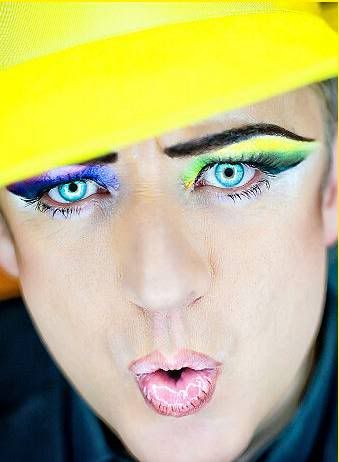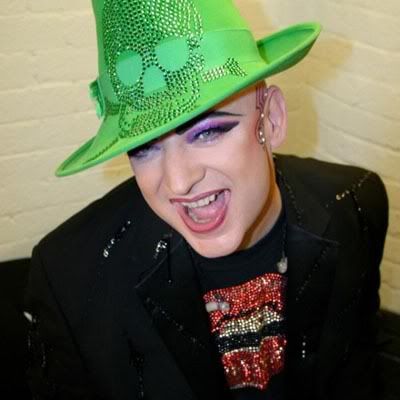-
Gay, straight, or just Lebanese?

Contrary to what Boy George may think, homosexuality is deep-seated in Lebanese culture – but it's not like it is in the west
In 1997, when Boy George shouted at his concert in Beirut: "Lebanon needs a dose of camp!" did he know what he'd bargained for? The gay scene in Lebanon has certainly changed during the last 13 years, but the real challenges are still ahead.
Not that the camp wasn't there already. In a small, unsophisticated Beirut bar, a group of cross-dressing men had organised a party in Boy George's honour. However, the Lebanese concert promoter prevented him from going there, after he deemed the place not "classy" enough. At the time, it was a brave move of these cross-dressing men, as such parties were still very much underground.
Decades of religious hypocrisy and political moralism had taken their toll. Police harassment and blackmail were frequent, thanks mainly to a law inherited from French rule. Many gay men sought political asylum in the west. But only the poor and "unconnected" faced these problems. The rich and powerful gay population had nothing to fear, as it threw its parties in "classier" venues.
In recent years, Lebanese gay men and women have become more visible in public places and the media. And there is less fear of harassment since the anti-homosexuality law is no longer really applied.
But how much have things truly changed? A stone's throw away from an infamous police station where gay men were humiliated and interrogated (for things such as wearing makeup) just a few years ago, a gay "bear" club has opened, which refuses entry to any "effeminate-looking" men.
Lebanese society is very macho. "In Lebanon they like to humiliate you," my friend Chadi told me, after he went to live in Bahrain, where he feels much more respected. "Gay" in Lebanon is usually applied to feminine-looking men, and their lives can be a long trail of taunting, harassment and abuse.
Although same-sex relations are very common among Lebanese men, most of their efforts go into trying to deny them. And a "gay-looking" man automatically becomes a pariah, or at best a sex object, with very limited social rights. This is especially true in Christian communities (where I was raised).
But this "manly love" is not always hidden. Sometimes it expresses itself in a very demonstrative way, at least in less "educated" milieux. Many Mediterranean men, despite their religious upbringing, will gladly revert to their pagan origins, to the Dionysian pleasures of yore.
The fact remains that lines between "gay" and "straight" are very undefined in Lebanon. That doesn't mean openly gay men are always respected but it does mean that there is no organised homophobia as one can find in some western countries. As for the pariahs, many of them succeed in transforming their situation into positions of power: they become adulated drag queens, artists … or priests. In fact, they are at once despised and revered, feared and secretly admired. They become "glorious pariahs" of sorts.
In this setting, what can be done to enhance the situation of the gay Lebanese? Organise a gay pride event?
Why not remove the gay shame instead? Phoenicians and Romans had no need for gay pride because they had no gay shame in the first place. And if the rich and "westernised" Lebanese dared venture into more working-class streets, they would see real gay pride in action, not just rainbow flags being waved once a year. In fact, a gay pride day would probably look like the icing on the McDonaldisation cake, now that Lebanon has its shopping malls, Big Brother-style TV programme and … its surveillance cameras. On every street corner. And in and around gay hangouts. The question is not: what does the gay crowd have to hide? But rather: why should it be made to show everything? And who is behind the cameras? Could it be the same policemen who "interrogated" gay men a few years ago, subjecting them to "anal tests"?
Advocate for gay rights? Some groups have taken a positive step in this direction. However, the language and concepts they use seem to be copied from the "little pink book" of western advocacy groups and are sometimes unadjusted to local gay realities. For instance, some of them call for more "public displays of affection" in a society that is already very homoerotic.
That the rainbow flag has become yet another global brand is not a secret any more. Many wear it the way they would wear a Prada logo, or as a sign of belonging to a westernised "enlightened" elite (when most Lebanese have no idea what this flag represents).
What Lebanon needs in order to genuinely advance gay rights is a leap into modernity. Not an imported, ready-made idea of modernity. But, instead, one that reclaims the past and reinterprets local culture.
For instance, why not introduce in schools the rich and abundant same-sex literature of Rumi or Omar Khayyam? This would surely silence those who claim that "homosexuality is a western trend aimed at corrupting our youth".
What Lebanese society also needs is to come to terms once and for all with its innate dilemma: the need to conform to social and religious dictates versus its natural "pagan" inclinations. For inspiration, it shouldn't exclusively turn to the west, but rather to the east, where religions entertain a more relaxed relationship with sexuality.
Until this happens, would Boy George fancy giving another concert in Lebanon and telling us whether camp there has reached a satisfying level yet?
http://www.guardian.co.uk/commentisfree/2010/aug/28/lebanon-gay-pride-boy-george
-
Commentaires












